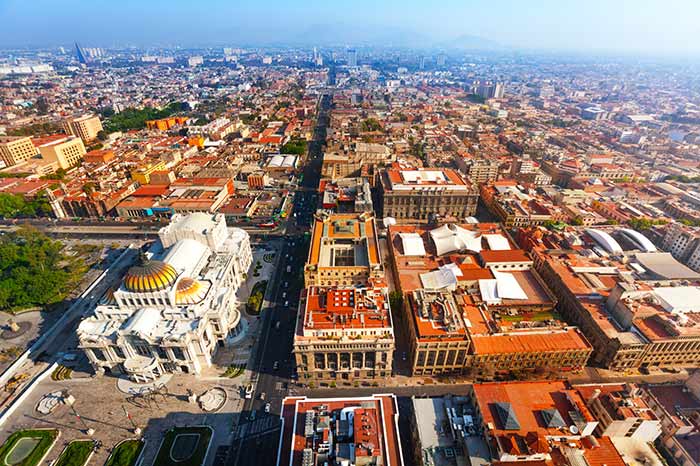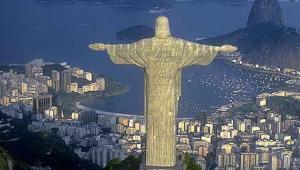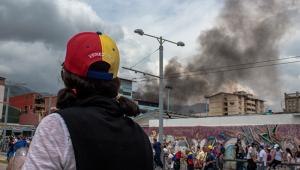web_mexicocity_istock_000063176331_medium.jpg

Mexico city, the capital of Mexico.
Mexico’s downtrodden are awaiting their new messiah.
They have been doing so ever since the fabled reign of President Lázaro Cárdenas who, with the flick of a pen in 1938, created a modern foundation myth by nationalising the oil industry
In doing so, Cárdenas established the enduring features of a munificent, all-powerful presidency that so many Mexicans still cherish – a “tlatoani” to use the Aztec term for ruler.
So it seems fitting that when Mexicans vote on Sunday they are likely to elect a self-styled heir to Cárdenas’s legacy who pledges to roll back reforms in 2013 that overturned his landmark achievement by opening the oil sector to foreign capital.
 With a huge polling lead over his rivals, the leftwing candidate Andrés Manuel López Obrador – known as “AMLO” and pictured right – is on the verge of a landslide after 18 years of trying.
With a huge polling lead over his rivals, the leftwing candidate Andrés Manuel López Obrador – known as “AMLO” and pictured right – is on the verge of a landslide after 18 years of trying.
The coalition led by the party he founded just four years ago, the National Regeneration Movement (Morena), could also sweep the board in congressional elections.
The charismatic 64-year-old former mayor of Mexico City – dubbed a “tropical messiah” by one historian – has promised a new Mexican revolution to tackle the country’s deep-seated problems.
There seems little doubt that it needs a messiah.
Half the population lives in poverty, violence is at record levels, corruption is endemic, the peso has slumped, and its northern neighbour is stoking a trade war.
Half the population lives in poverty, violence is at record levels, corruption is endemic, the peso has slumped, and its northern neighbour is stoking a trade war.
AMLO promises to suspend the energy reforms, reduce inequality, tackle corruption, end criminal violence, and inject new vitality into Mexico’s troubled democracy.
Expectations are so high that this new messiah will need to work a miracle.
But for many both within and outside Mexico, López Obrador remains an enigma whose beliefs are ambiguous and whom critics denounce as a false prophet.
To supporters, he is a progressive reformist in the mould of other leftwing leaders who came to power throughout Latin America after 2000.
To his detractors, he is a dangerous populist akin to the late Hugo Chávez whose fiscal recklessness bequeathed Venezuela catastrophic economic problems.
Persistence and hostility
A veteran politician, López Obrador’s record has been shaped by consistent opposition to the Institutional Revolutionary Party (PRI), an unrivalled political machine that ruled Mexico unchallenged for 70 years until 2000, then rebounded in 2012.
AMLO cut his teeth in his native state of Tabasco, founded a leftwing opposition party, ran Mexico City, mounted failed bids for the presidency in 2006 and 2012, and launched Morena in 2014.
His vision begins with a pledge to resurrect an interventionist state to counter the neoliberal policies followed loyally since the 1980s. After 30 years of economic liberalisation, yawning gaps persist between rich and poor and the industrial north and rural, indigenous south.
His plans include a massive infrastructure boost, price guarantees for southern crops, and universal pensions. It is an expensive wishlist.
A second pillar of his platform is to tackle endemic corruption and fix a broken political system – a credible promise given the tenure of the PRI incumbent, Enrique Peña Nieto, whose failure to tackle impunity and poor record on graft has made him deeply unpopular.
Unsurprisingly, the new messiah’s ascension has stoked hostility among zealots who foretell of “economic populism” resulting in a Venezuela-style car crash – mud that sticks in Mexico, which endured major devaluations in 1976, 1982 and 1994.
Top companies have issued dire warnings about López Obrador’s spending promises and business leaders have engaged in a war of words with the candidate.
Hostility has been fanned by predictable unease in Washington and in influential media such as the Washington Post and Economist.
Some prominent intellectuals point to the Morena leader’s disdain for institutions as a harbinger of authoritarianism, claiming he will take Mexico back to an era of “corporatism” when PRI presidents bought off key social sectors to maintain their iron grip on power.
Signs of pragmatism
López Obrador has bitten back, branding businessmen a “mafia”, calling supreme court judges gangsters, and using social media to ridicule outlandish accusations against him.
Moreover, there are signs that he is being far more pragmatic than in past presidential bids.
He pledges fiscal responsibility, telling investors he will run a zero-deficit government, says he will fund his spending by eradicating corruption and cutting government salaries – thereby avoiding tax increases – and insists there will be no nationalisations.
A key barometer of his policies will be his approach to the oil sector, and how he delivers on his threats to Peña Nieto’s energy reforms.
There have been reports that advisers have persuaded him to drop plans for a referendum to repeal these, and Morena advisers hint that private oil-drilling contracts will be unaffected.
Another sign of AMLO’s pragmatism has been his calm attitude towards President Donald Trump – who has riled his neighbours – mindful that Mexico is a key US trading partner.
Last but not least, López Obrador has adopted a centrist, conciliatory tone to maintain the eclectic coalition that he has nurtured to broaden his political appeal, which takes in a wide spectrum of opinion – from economic nationalism to the religious right.
This speaks volumes about the skilful way the Morena candidate has used Mexico’s potent revolutionary symbolism to foster unity.
But it also highlights how misgivings about any attempt by López Obrador to concentrate power may be misplaced.
His popularity does not derive from an old-fashioned desire to overturn capitalism, but a modern reflex to rebalance Mexico’s economy – and satisfy a deep yearning for change.
The approach he advocates fits neatly within the traditions shaped by Cárdenas based on a powerful presidency, an activist state, and social consensus.
Ironically, these kept the PRI in power for 70 years – and transformed a rural backwater into an economic powerhouse.
If anything, then, the real questions posed by the coming of Mexico’s new messiah are not about his vision of the future – but about his vision of the past.














